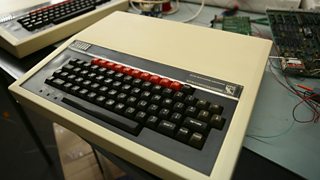An archive for the 1980s microcomputer revolution
David Allen and Steve Lowry
Computer Literacy Project; editor, and programme engineer
Tagged with:

主播大秀 Micro, a cornerstone of the Computer Literacy Project
On 27 June the 主播大秀 launched an archive featuring a host of programmes from a 1980s project that helped make Britain .
In 1978 the 主播大秀 began to look at the potential impact of microelectronics on jobs, education, industrial competitiveness and new products – and what emerged was Britain’s relative unpreparedness and the need for public awareness.
Back then, even university students’ interaction with computers was still occasional and distanced, with programs typed onto punched cards and mainframe computers hidden away.
By the early 1980s though the 主播大秀 had started to plan a national computer literacy campaign with television and radio, books, courses, advice services, software and controversially its own microcomputer, also known as the 主播大秀 Micro.
All together this became the 主播大秀’s Computer Literacy Project (CLP), to encourage people to get their hands on a computer and have a go, and based on a successful 主播大秀 adult literacy campaign from a few years earlier.
In 1981 the company chosen for the machine was Cambridge-based Acorn, and the 主播大秀 Micro was launched before a major government initiative to introduce computer literacy in schools the following year.
So successful was the CLP that the whole of a Sunday morning on 主播大秀 One was taken up with what turned out to be the first of the Micro Live programmes. A mix of feedback, news and phone-ins, with contributors including Bill Gates and Douglas Adams, there was even a notorious incident where our demonstration of email was hacked live on air.
Decades later, the CLP seemed to have helped inspire . However, when researching talks and presentations it proved difficult to find good quality television clips, and the idea of an archive was born.
Collected from different sources and at various qualities the programmes were slowly found, although sadly the radio material seems to have been lost.
Those programmes from the 1980s still stand up to scrutiny today - even 30 years ago there was debate about the effects of computers on employment, and how digital technology could influence votes during elections.
Starting as an unofficial initiative, it has since been demonstrated to potential users at the Science Museum, in London; the Museum of Computer History, in Cambridge; and the National Museum of Computing, at Bletchley Park.
The archive has been a labour of love, for us and many others, with more than 2,700 items that you can search, find and play for their specific content.
Some things in IT have been with us for longer than we might remember, and without an archive to remind us, there is a danger that we will forget.
You can view the Computer Literacy Project archive .
Short film about the launch of the Computer Literacy Project archive
